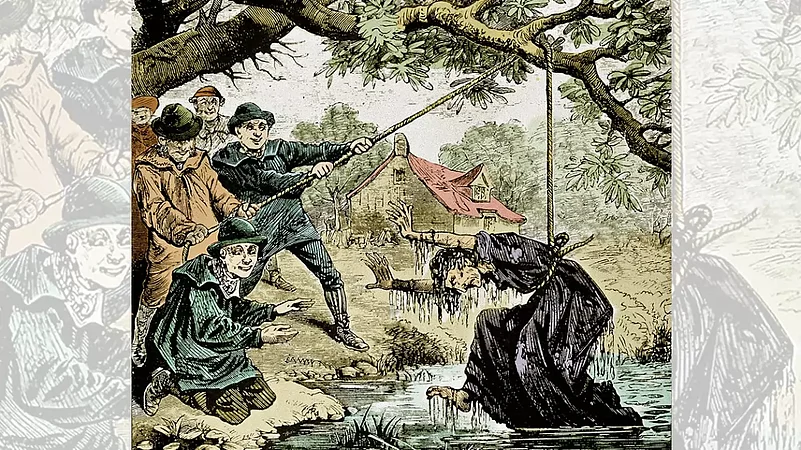Murders, mainly of women, on the charge of being witches (i.e. using supernatural powers to cause harm) are reported by the National Crime Records Bureau (NCRB) to have been the motive behind an average of 168 murders a year between 2001 and 2016, with another 66 in 2019. These are likely to be underestimates since many witch killings could be listed as due to women’s claims to land and other property, which often cause accusations of witchcraft. Women accused of and brutally tortured for being witches are many more than those killed. ASHA, an NGO in Jharkhand, estimates that about 10 percent of women in Jharkhand’s villages have been victims of being accused as witches. The women are punished in inhuman ways for their alleged diabolical activities. The violence inflicted on them includes humiliation, banishment from home and killings along with the seizure of land and properties. This form of abuse of their human rights came to the attention of some state governments in India and also of the United Nations Human Rights Council as an international problem as early as 2009, in 2017 and, once again, in July 2022, where one of the authors (Govind Kelkar) was invited to make a presentation on witch persecution in Asia.
The incidence of the persecution of women as witches is not trivial. While there are instances of witch hunting among non-Adivasis and in rural areas, this phenomenon is concentrated in the central Indian Adivasi belt and, even there, it is confined to Adivasi women. Men who get caught in such persecution are often those who stand in support of their wives facing such accusations. Among the matrilineal Khasi in Meghalaya, men are usually the prime victims, accused of feeding human blood to the mythical serpent, thlen. Among the Nagas, too, men can be accused of having the ‘Tiger spirit’. Overall, women constitute around 80 percent of those killed, which is also the proportion in the witch hunts of medieval Europe.
In our book Witch Hunts: Culture, Patriarchy and Structural Transformation, we analysed the factors leading to witch hunts. The first factor is that of culture, in the form of a belief that some humans (mostly women) acquire supernatural powers and use those powers to cause harm to others. The harm may be material, such as poor crops or the death of animals, or disease. In fact, disease, particularly unexplained is of the immediate provocation for accusations of witchcraft. As Helen Macdonald points out in her book Witchcraft Accusations in Central India: The Fragmented Urn, in the 19th century, when cholera was a mysterious and deadly infection, women were often accused of being ‘cholera witches’. During the recent Covid-19 pandemic, there have been reports of women accused of being ‘Covid witches’. The cultural belief in the existence of witches goes along with the belief that it is women who acquire these supernatural powers and cause evil. This is part of the struggle of men to establish their domination or patriarchal control within society. By categorising women as potential witches, they are excluded from forms of spiritual knowledge and even from participation in political affairs. They cannot own land, which must be inherited in the patrilineal line.
These struggles over witches and patriarchy themselves constitute a form of structural transformation, a transformation into patriarchy, an overall system of male dominance in the family, community, village, and supra-village levels. In addition, however, we have found that these struggles occur within an overall transformation from a subsistence economy to one of accumulation, the capitalist transformation that these societies are undergoing. Europe in the early modern period (1400 to 1800 CE) was also undergoing such a transformation, as were many countries of Africa, indigenous peoples in the Asia-Pacific region and in Amazonia in Latin America.
Witch hunts, then, are not the result of superstition but of a combination of cultural beliefs and the struggle to create and recreate patriarchy within a society undergoing structural transformation from a subsistence to an accumulative economy. It is also a clash between an older communitarian ethic and a newer market-based ethic of individual accumulation that brings about or increases inequality, subordination, and the silencing of women.
In our studies across central India, we have found that attempts to seize land from women’s control in an unsupported existence, for instance, after the death of a husband, and jealousy based on some families doing better than others are the main factors that lie behind accusing people to be witches. This factor is directly related to strengthening patrilineal succession and the accumulation of property along the male line. Other factors that drive the persecution of women as witches include jealousy towards women whose children and families do better and who exercise their agency in decision-making by, say, trying to become a village or ward leader. Subsistence economies usually have certain features, such as the village feasting and the culture of sharing food and grain with relatives. Thus, there can be expectations that those doing better share some of their increased income with relatives. Failure to do this can result in the accusation that the gains were ill-gotten.
The impact of witch hunts and witch accusations is not just abuse of human rights but also manifested in inhibiting women’s agency, i.e., in their ability to take decisions and act on them. There is a fear of being accused of being too smart, in terms of asserting their rights to make decisions by themselves or trying to go against custom. In some countries in Africa, there are reports of retired employees being scared of building better homes, lest they be accused of having acquired wealth through witchcraft. Any woman who does better, or whose children and immediate family do better, can be accused of being a witch, with all its consequences of torture in the community’s presence or being driven out from the village or being killed. So, what can be done to end witch hunts? Many states in India, such as Odisha, Rajasthan, Jharkhand and Assam, have passed laws making such persecution illegal. Even the accusation that someone is a witch is illegal. There is a need for such laws and for their strengthening and implementation, with strict punishment for the offenders. But laws are never enough.
There is a need to address the cultural beliefs underlying witch hunts. As pointed out above, there are strong cultural systems behind these beliefs. These are aspects of a culture whose continuation should not be encouraged in the name of preserving identity. In any culture, it is necessary to work to eliminate negative aspects such as denying women political rights in traditional governing institutions. In Jharkhand, Odisha, and Assam, there are government projects to eliminate the belief in the existence of witches.
Such actions for raising consciousness about the negative aspects of culture and the impact of witch hunting should be taken up on a sustained basis, 1) through the formation and strengthening of village-based women’s groups and sub-district level federations; 2) mobilisation of women in support of their rights to land and income and against persecutory practices; 3) sensitisation of village assemblies, civil society organisations, indigenous and rural leaders with respect to persecution of women as witches as well as to accept women’s right to land, property and decision-making; and 4) raise legal and human-rights awareness against witch hunting.
(This appeared in the print edition as "Ending Witch Hunts")
(Views expressed are personal)
Govind Kelkar is executive director and professor, Gendev centre for research and innovation, Gurgaon
Dev Nathan is a professor at the Institute of human development, New Delhi

















